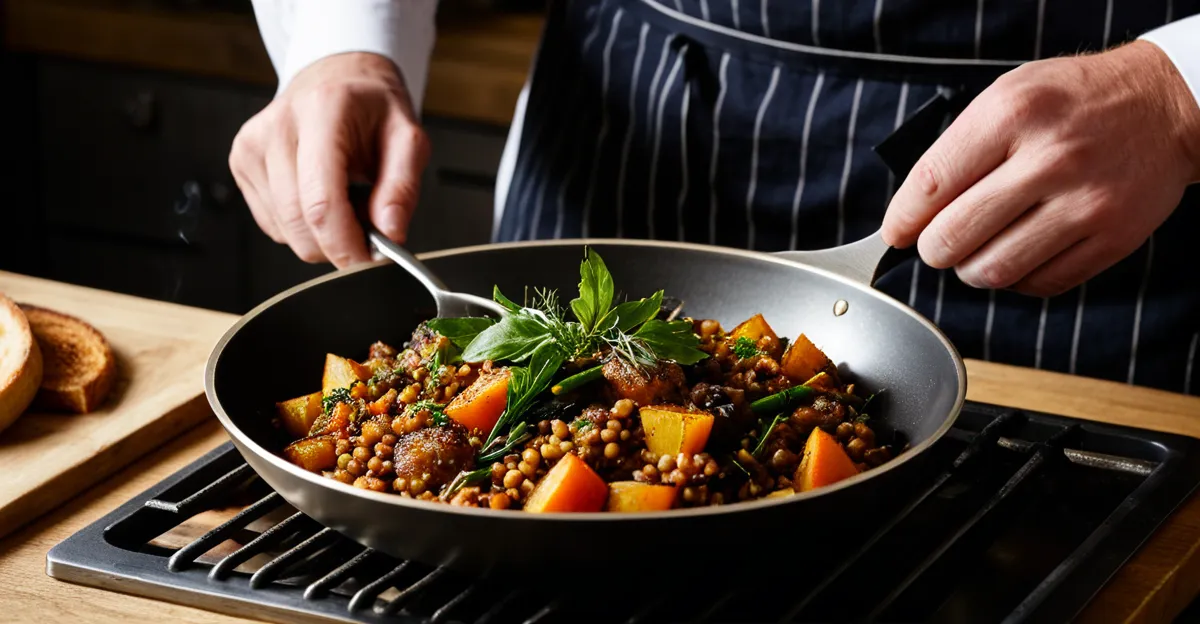Integrating Classic UK Cooking Techniques into Modern Cuisine
Blending traditional British cooking methods with today’s culinary innovation enriches modern dishes while honoring heritage. Iconic UK cooking techniques—such as roasting, poaching, baking, and pickling—continue to hold value because they bring flavor depth and texture that modern methods often lack.
Roasting, for example, imparts caramelization and rich aromas; poaching gently preserves moisture and delicate flavors; baking creates comforting crusts and fillings; pickling introduces acidity and complexity. These techniques are fundamental building blocks in the UK culinary repertoire.
In the same genre : How do you master the art of making a classic English scone?
To successfully blend tradition with innovation, it’s essential to understand the basic principles behind each technique. This enables cooks to adapt cooking times, seasoning, and ingredient pairings confidently. For instance, pairing classic roasting with contemporary spices or using modern kitchen tools to enhance poaching precision helps update the cooking style without losing authenticity.
Moreover, adapting these methods encourages experimentation with textures and presentations, inviting creativity while respecting traditional British cooking. This fusion results in dishes that reflect both history and contemporary tastes, keeping the UK’s culinary culture vibrant and relevant in today’s kitchens.
Topic to read : How can you prepare a flavorful and hearty haggis?
Enhancing Modern Dishes Through Roasting
Roasting is a cornerstone of British roasting techniques, prized for its ability to develop deep flavours and crisp textures. To innovate, chefs blend classic methods with modern flavour profiles and ingredients. For example, adding exotic spices or fresh herbs elevates traditional roasting while respecting the original technique.
When adapting roast recipes, refinement in plating transforms familiar UK classics into visually striking dishes. Consider a modern roast vegetable medley where seasonal vegetables are caramelized and artfully arranged, offering both rustic charm and contemporary appeal. Similarly, a deconstructed Sunday roast breaks down and reinterprets familiar components, enhancing texture contrasts and presentation while retaining the comforting flavours of the original.
The success of updated roast recipes lies in understanding and preserving the fundamental principles of roasting—consistent heat, proper seasoning, and timing—while embracing innovations. This fusion allows cooks to maintain the soul of classic roasting while engaging modern palates. By doing so, British roasting techniques remain dynamic and relevant, ensuring heritage cooking traditions thrive in contemporary kitchens.
Creative Use of Poaching and Baking
Poaching and baking remain vital culinary techniques deeply rooted in British culinary heritage, yet they offer exciting avenues for modern recipe adaptation. Poaching, a gentle cooking method, preserves the delicate texture and moisture of ingredients, making it ideal for contemporary seafood dishes such as poached salmon enhanced with infused oils or herbs. This technique is also increasingly applied in plant-based recipes, providing tender, flavorful results without harsh cooking methods.
Baking, a hallmark of traditional British food, evolves to meet modern tastes by incorporating global flavours and innovative fillings. For example, classic British pasties can be reimagined with unexpected spices or vegetarian ingredients, while savoury scones gain new life by integrating international cheeses or fresh herbs. These updates retain the essence of British baking while appealing to diverse palates.
The success of poaching and baking in modern dishes relies on mastery of the core principles: controlling gentle heat for poaching, and precise temperature and timing for baking. Combining these with contemporary ingredients or presentation styles enables chefs to honour tradition while creating engaging, forward-thinking cuisine. Thus, integrating poaching and baking exemplifies the seamless blending of traditional British cooking methods with modern culinary innovation.
Reviving Pickling and Fermenting for Today’s Palate
Pickling and fermentation are time-honoured traditional British cooking techniques that bring vibrant acidity and complex flavours to dishes. Their revival in modern kitchens provides exciting opportunities for modern recipe adaptation, particularly in creating unique culinary techniques that enhance sauces, sides, and condiments.
Pickling involves preserving vegetables or fruits in vinegar or brine, which not only extends shelf life but also deepens flavour profiles. Today’s chefs experiment with non-traditional produce and fusion spices—such as pickled beetroot infused with cumin or chilli—expanding the palate beyond classic UK tastes. Fermentation, a slower biochemical process, enriches textures and introduces beneficial probiotics, as seen in fermented piccalilli relishes that combine heritage ingredients with contemporary seasoning.
Why does pickling remain relevant? Its adaptability allows incorporation of seasonal, local, or exotic ingredients, aligning well with current trends towards sustainability and flavour exploration. Moreover, mastering fundamental pickling principles—such as maintaining hygiene, controlling acidity, and timing—is key for successful modern recipe adaptation.
By reviving these classic methods with innovative twists, cooks preserve the essence of British culinary culture while catering to evolving tastes, proving pickling and fermentation are indispensable in today’s dynamic kitchens.






